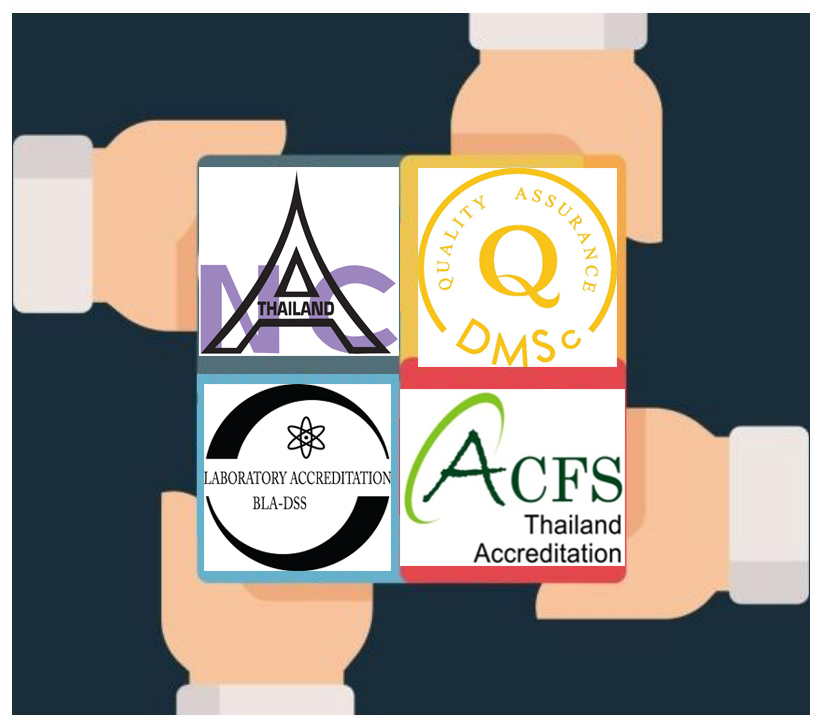
There are four accreditation bodies (ABs) operating in Thailand however, only the National Standardization Council (NSC) – Thai Industrial Standards Institute (TISI) – Ministry of Industry is a full member signatory to both the ILAC MRA and IAF MLA. The Bureau of Laboratory Quality Standards (BLQS-DMSc) – Department of Medical Sciences – Ministry of Public Health, and the Bureau of Laboratory Accreditation (BLA-DSS) – Department of Science Service – Ministry of Higher Education, Science, Research and Innovation hold full membership and signatory status to only the ILAC MRA while the Office of Standard Accreditation (OSA) – National Bureau of Agricultural Commodity and Food Standards (ACFS) – Ministry of Agriculture and Cooperatives holds full membership and signatory status to only the IAF MLA. All of these ABs are Government Agencies working as the agency-in-charge for standardization in a specific field of accreditation (such as testing and calibration laboratories, medical laboratories, reference material producers (RMPs), and product certification programs). Their specific scope of activity relates to the National Standardization Act B.E. 2551 (2008) of the national standard committee under the Cabinet approval.
The implementation of the United Nations Sustainable Development Goals (SDGs), the benefits of the multilateral MRA for greater efficiency, cost savings on the ease of doing business policy, and the ongoing global pandemic of the coronavirus disease 2019 (COVID-19) provide significant opportunity for the Thai Public Policy Government to improve its own performance. A Memorandum of Understanding (MoU) on a single platform for accreditation was signed between the four ABs to strengthen the cooperation on 15th December 2020. This partnership aims to reduce the redundancy and unnecessity of multiple onsite assessments and accreditations from different ABs with specific areas of accreditation activities for customers.
Presently, the unified accreditation reform has commenced with testing laboratory accreditation by using joint assessments between ABs under the ‘single scheme’ of the same standard (i.e. ISO/IEC 17025) and under the ‘multiple schemes’ of different standards (i.e. ISO/IEC 17025 and ISO 15189). Currently a laboratory can apply with only one AB for any scope of testing where that AB has the MRA recognition. For example, currently, a laboratory has to apply for ISO/IEC 17025 testing scope of accreditation with NSC for industrial chemicals; with BLQS-DMSc for pharmaceuticals; and with BLA-DSS for waste water. From now on, the laboratory will be able to apply to just one AB as a single point of contact (“one stop service”), for the entire scope of testing activities, and still be verified compliant with the standard. The platform however, is currently only voluntary, so a customer may maintain accreditation with each individual AB as per usual should they wish.
The next step, is to set up ongoing monitoring and reporting systems that interface with this platform. We look forward to working with the simplified and harmonized processes and procedures of each AB to expand the unified accreditation model., In the future we plan to establish the “one application – one platform – one certificate” for testing laboratory accreditation, and also expand this platform to other MRA/MLA scopes such as reference material producers (RMP), proficiency testing providers (PTP), management system (MS) as well as extending the scope of the recognition to the MRA/MLAs to cover other conformity assessment body activities in Thailand (e.g. biobanking facilities specifying accreditation complying with ISO 20387 and medical device accreditation complying with ISO 13485).
We held a public hearing addressing these proposed changes on Wednesday, September 1, 2021 via the zoom cloud meeting application to communicate and promote the changes to our customers, and also to receive input and feedback. Approximately 650 participants shared their thoughts with discussion and opinions regarding this joint initiative. This input will allow us to pursue a better modifying process. Participants at the public hearing approved of the initiative and few of the customers have already decided to apply using this platform on their next cycle of assessment supporting sustainability in accreditation. Finally, this joint supporting service was approved to start in October 2021 and is expected to be a great success with acceptance from customers. It will also help to stimulate competitiveness in the economy, and keep up with global changes especially in this time of COVID-19 restrictions.
